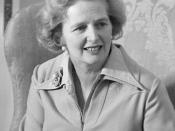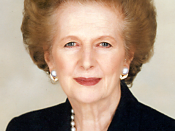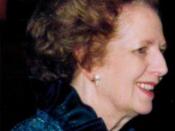Can there be set characteristics which make you a leader? If we take for example two effective leaders such as Margaret Thatcher and Richard Branson they lead in very different ways and possess very different traits. Thatcher was very outspoken and dominant, with "warrior" characteristics, where as Branson is much more manipulative and subdued. This isn't to say they don't possess any of the same characteristics, may be they are both very self confident people. It is the characteristics which they share which could be linked to effective leadership, but not necessarily what make them a leader. The main point is that they possess very different characteristics, but are both extremely effective leaders. Hence there is only a weak link found between personal traits (i.e. traits you are born with) and leader success. Epstein researched this area and began by identifying the traits of people who had achieved "greatness" and tried to identify traits which they all possessed, and distinguished them from others.
They identified 5 main characteristics which consisted with effective leadership. These aren't characteristics which make someone a leader, but lead to effective leadership;-â¢intelligenceâ¢dominanceâ¢self confidenceâ¢level of energyâ¢activityIn the 1920's and 1930's, leadership research focused on trying to identify the traits that differentiated leaders from non-leaders. These early leadership theories were content theories, focusing on "what" an effective leader is, not on 'how' to effectively lead. The trait approach to understanding leadership assumes that certain physical, social, and personal characteristics are inherent in leaders. Sets of traits and characteristics were identified to assist in selecting the right people to become leaders. Physical traits include being young to middle-aged, energetic, tall, and handsome. Social background traits include being educated at the "right" schools and being socially prominent or upwardly mobile. Social characteristics include being charismatic, charming, tactful, popular, cooperative, and...


